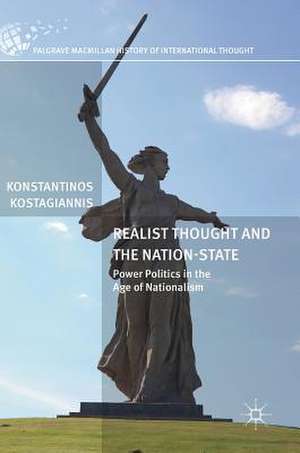Realist Thought and the Nation-State: Power Politics in the Age of Nationalism: The Palgrave Macmillan History of International Thought
Autor Konstantinos Kostagiannisen Limba Engleză Hardback – 28 sep 2017
| Toate formatele și edițiile | Preț | Express |
|---|---|---|
| Paperback (1) | 575.91 lei 38-44 zile | |
| Springer International Publishing – 10 aug 2018 | 575.91 lei 38-44 zile | |
| Hardback (1) | 640.71 lei 6-8 săpt. | |
| Springer International Publishing – 28 sep 2017 | 640.71 lei 6-8 săpt. |
Din seria The Palgrave Macmillan History of International Thought
- 18%
 Preț: 723.35 lei
Preț: 723.35 lei - 18%
 Preț: 780.52 lei
Preț: 780.52 lei -
 Preț: 384.70 lei
Preț: 384.70 lei -
 Preț: 383.71 lei
Preț: 383.71 lei -
 Preț: 389.11 lei
Preț: 389.11 lei -
 Preț: 385.62 lei
Preț: 385.62 lei -
 Preț: 383.71 lei
Preț: 383.71 lei -
 Preț: 386.61 lei
Preț: 386.61 lei - 15%
 Preț: 640.24 lei
Preț: 640.24 lei - 15%
 Preț: 640.06 lei
Preț: 640.06 lei -
 Preț: 389.70 lei
Preț: 389.70 lei -
 Preț: 394.87 lei
Preț: 394.87 lei -
 Preț: 388.52 lei
Preț: 388.52 lei -
 Preț: 381.98 lei
Preț: 381.98 lei - 18%
 Preț: 724.63 lei
Preț: 724.63 lei -
 Preț: 383.50 lei
Preț: 383.50 lei - 15%
 Preț: 640.88 lei
Preț: 640.88 lei -
 Preț: 383.50 lei
Preț: 383.50 lei - 15%
 Preț: 639.59 lei
Preț: 639.59 lei - 18%
 Preț: 733.03 lei
Preț: 733.03 lei - 18%
 Preț: 727.48 lei
Preț: 727.48 lei -
 Preț: 417.90 lei
Preț: 417.90 lei - 15%
 Preț: 692.56 lei
Preț: 692.56 lei - 15%
 Preț: 690.11 lei
Preț: 690.11 lei -
 Preț: 391.61 lei
Preț: 391.61 lei - 15%
 Preț: 640.06 lei
Preț: 640.06 lei -
 Preț: 386.00 lei
Preț: 386.00 lei -
 Preț: 386.61 lei
Preț: 386.61 lei -
 Preț: 383.12 lei
Preț: 383.12 lei -
 Preț: 386.81 lei
Preț: 386.81 lei
Preț: 640.71 lei
Preț vechi: 753.77 lei
-15% Nou
Puncte Express: 961
Preț estimativ în valută:
122.64€ • 133.26$ • 103.08£
122.64€ • 133.26$ • 103.08£
Carte tipărită la comandă
Livrare economică 21 aprilie-05 mai
Preluare comenzi: 021 569.72.76
Specificații
ISBN-13: 9783319596280
ISBN-10: 3319596284
Pagini: 213
Ilustrații: XVI, 213 p.
Dimensiuni: 148 x 210 mm
Greutate: 0.43 kg
Ediția:1st ed. 2018
Editura: Springer International Publishing
Colecția Palgrave Macmillan
Seria The Palgrave Macmillan History of International Thought
Locul publicării:Cham, Switzerland
ISBN-10: 3319596284
Pagini: 213
Ilustrații: XVI, 213 p.
Dimensiuni: 148 x 210 mm
Greutate: 0.43 kg
Ediția:1st ed. 2018
Editura: Springer International Publishing
Colecția Palgrave Macmillan
Seria The Palgrave Macmillan History of International Thought
Locul publicării:Cham, Switzerland
Cuprins
1. Introduction.- 2. The Three Facets of Power and the Nation-State in the Realism of E. H. Carr.- 3. Hans Morgenthau's Realism: Power as the Nemesis of the Nation-State.- 4. John Herz and Realism's Moment of Transition.- 5. Nationalism and the Nation-State in Structural Realism: John Mearsheimer's Offensive Realism.- 6. Conclusion: Power Politics in the Age of Nationalism.
Notă biografică
Konstantinos Kostagiannis is Lecturer in International Relations at the University of Maastricht, Netherlands. He holds a PhD from the University of Edinburgh, UK. He has previously published in Millennium, International Politics, and The International History Review.
Textul de pe ultima copertă
This book recovers the history of realist theorization on nationalism and the nation-state. Presented in a sequence of snapshots and illustrated by examples drawn from the foreign policy of great powers, this history is represented by four key realist thinkers. It uses the centrality of power in realism as a starting point to claim, contrary to conventional wisdom about realism, that for realists the state is better understood not as a political unit outside history but rather as a manifestation of power unfixed in time. It also claims that the process of gradual impoverishment of the concept of power from classical to structural realism had profound implications for realism, as what the latter gained in parsimony it lost in analytical purchase. As a result, elaborate understandings of nationalism and its relation to the state are replaced by one-dimensional approaches. In order to offer meaningful engagement with foreign policy, neorealists often have to resort to the recovery ofsome of the complexity of classical realist accounts.
Caracteristici
Explores the evolution of realist thought on nationalism and the nation-state Examines the interplay between nationalism and the foreign policy of great powers in the work of seminal realists Challenges conventional wisdom about the centrality of state in realism
